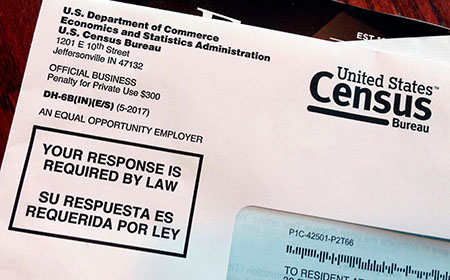by WorldTribune Staff, May 10, 2021
Census data show that nearly four million more ballots were counted in the 2020 presidential election official count than were self-reported by voters on the 2020 Census.
 According to the Census, the recorded number of people voting in 2020 was 154,628,000. The official results place the number of actual ballots cast slightly north of 158 million.
According to the Census, the recorded number of people voting in 2020 was 154,628,000. The official results place the number of actual ballots cast slightly north of 158 million.
Census data in past election have “almost always been accurate,” lawyer Robert Barnes said, according to a May 10 report by The Election Wizard. “Isn’t it amazing that it [under reporting] is almost exactly the number of questionable Biden ballots?”
As part of the Census, the government collects data on citizens who self-report as having voted in presidential elections.
The Census has missed the mark many times, but in those cases it almost always over-recorded the number of citizens who voted compared to the official results.
The Census Bureau recorded the number of those who voted in the 2004 election as 125 million, while official results placed the total at 122 million.
The same over-recording occurred in 2012, with the Census over-reporting the number of voters by several million. In 2016, the Census Bureau still over-recorded the number of voters compared to the official results.
Even in the contested 2000 election, the Census over-recorded, showing 111 million voted. Official results placed the popular vote figure at 105 million.
The 2020 Census numbers are “as good of evidence as you could possibly have” that there were some four million or more “questionable ballots … that the Census itself says are counting votes of people who claim they didn’t vote,” Barnes said.
Barnes pointed out the Census data also calls into question a number of contested states.
In Georgia, the Census Bureau recorded roughly 4.8 million voting, while official results show slightly less than 5 million. Barnes said the discrepancy is consistent with claims that there were roughly 100,000 questionable ballots cast in Georgia.
Pollster Richard Baris said that election analysts have often viewed the Census data as generally reliable. Yet, for some reason, some have now flipped the script, claiming the 2020 data is the result of a Census “blunder.”
Baris noted: “For everything to be on the up-and-up, we have to accept that all of these other things [predictors of illegal ballots] … are not only all wrong at the same time, but that they are all wrong for the first time ever in some cases.”
Baris said he can’t bring himself to accept all of the anomalies, including the Census’s under-reporting, as merely the product of an innocent coincidence. “It’s just too much for me,” he said.
INFORMATION WORLD WAR: How We Win . . . . Executive Intelligence Brief
